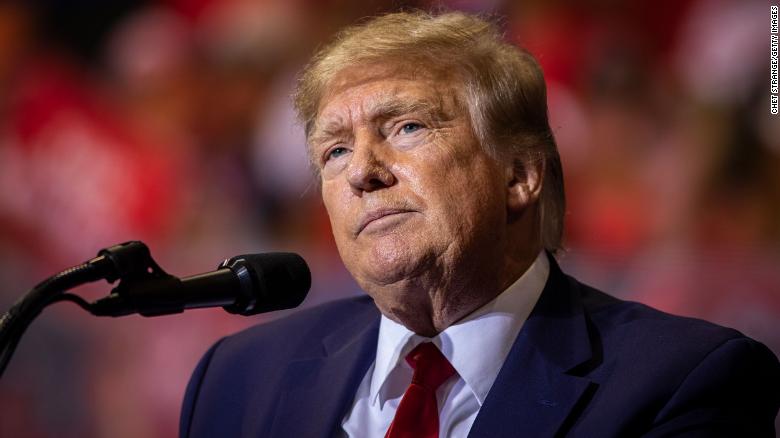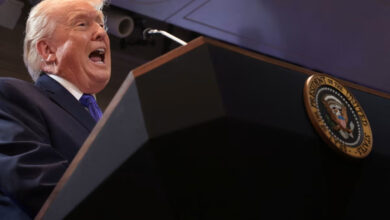
“Our determination is that the risk [to public safety] has sufficiently receded,” Meta President of Global Affairs Nick Clegg said in a blog post. “As such, we will be reinstating Mr. Trump’s Facebook and Instagram accounts in the coming weeks. However, we are doing so with new guardrails in place to deter repeat offenses.”
Trump could be suspended for as much as two years at a time for violating platform policies in the future, Clegg said.
With his Facebook and Instagram accounts reactivated, Trump will once again gain access to huge and powerful communications and fundraising platforms just as he ramps up his third bid for the White House.
The decision, which comes on the heels of a similar move by Twitter, could also further shift the landscape for how a long list of smaller online platforms handle Trump’s accounts.
It was not immediately clear whether Trump will seize the opportunity to return to the Meta platforms. Trump’s reps did not immediately respond to a request for comment.
In a post on his own platform, Truth Social, Trump acknowledged Meta’s decision to reverse its suspension of his account and said “such a thing should never again happen to a sitting President, or anybody else who is not deserving of retribution.”
Former President Trump’s team was not given advance notice of Meta’s decision, a source familiar with the matter told CNN. Many of his aides and advisers learned of the decision from media reports. Shortly before the announcement, Meta asked for a last-minute meeting with Trump’s lawyers this evening to discuss his possible reinstatement, but were not told what the final decision was. They were still in the meeting when Meta released the news, the source said.
Twitter restored Trump’s account in November following its takeover by billionaire Elon Musk, but the former president has not yet resumed tweeting, opting instead to remain on Truth Social.
But Trump’s campaign earlier this month sent a letter to Meta petitioning the company to unblock his Facebook account, a source familiar with the letter told CNN, making his return more likely. Although Twitter was always Trump’s preferred platform, he has a massive reach on Facebook and Instagram — 34 million followers and 23 million followers, respectively, ahead of his reinstatement. Previous Trump campaigns have lauded the effectiveness of Facebook’s targeted advertising tools and have spent millions running Facebook ads.
Meta’s decision was quickly criticized by a number of online safety advocates and democratic lawmakers. Congressman Adam Schiff said in a tweet that restoring Trump’s “access to a social media platform to spread his lies and demagoguery is dangerous,” noting that Trump has shown “no remorse” for his actions around the January 6 attack. NAACP President Derrick Johnson called the decision “a prime example of putting profits above people’s safety.”
But ACLU Director Anthony Romero called the decision “the right call,” joining several other groups in praising the move. He added: “The biggest social media companies are central actors when it comes to our collective ability to speak — and hear the speech of others — online. They should err on the side of allowing a wide range of political speech, even when it offends.”
How Meta made the decision
The company made the landmark decision to bar Trump from posting on Facebook and Instagram the day after the January 6 attack, in which his supporters stormed the US Capitol in a bid to overturn the 2020 election results.
Many other platforms did the same in quick succession, but Facebook was clear that it planned to revisit the decision at a later date. After Facebook’s independent Oversight Board recommended that the company clarify what was initially an indefinite suspension, Facebook said the former president would remain restricted from the platform until at least January 7, 2023.
Meta earlier this month was considering whether to restore Trump’s accounts with the help of a specially formed internal company working group made up of leaders from different parts of the organization, a person familiar with the deliberations told CNN. The group included representatives from the company’s public policy, communications, content policy, and safety and integrity teams, and was being led by Clegg, who previously served as UK Deputy Prime Minister.
The company said in June 2021 that it would “look to experts to assess whether the risk to public safety has receded” in January 2023 to make a determination about the former president’s account.
“If we determine that there is still a serious risk to public safety, we will extend the restriction for a set period of time and continue to re-evaluate until that risk has receded,” Clegg, then-vice president of global affairs at Meta, said in a statement at the time.
Meta’s updated policy
Clegg said in his Wednesday post that the company believes “the public should be able to hear what their politicians are saying — the good, the bad and the ugly — so that they can make informed choices at the ballot box.” But, he said, “that does not mean there are no limits to what people can say on our platform.”
In light of his previous violations, Trump will now face “heightened penalties for repeat offenses,” Clegg said, adding that the policy will also apply to other public figures whose accounts are reinstated following suspensions related to civil unrest.
Clegg told Axios in an interview published Wednesday that the company does not “want — if he is to return to our services — for him to do what he did on January 6, which is to use our services to delegitimize the 2024 election, much as he sought to discredit the 2020 election.”
“In the event that Mr. Trump posts further violating content, the content will be removed and he will be suspended for between one month and two years, depending on the severity of the violation,” Clegg said. However, the possibility of permanent removal of Trump’s accounts — which Clegg had previously indicated could be a consequence of future violations if his account were to be restored — no longer appears to be on the table.
For content that doesn’t violate its rules but “contributes to the sort of risk that materialized on January 6th, such as content that delegitimizes an upcoming election or is related to QAnon,” Meta may limit distribution of the posts, Clegg said. The company could, for example, remove the reshare button or keep the posts visible on Trump’s page but not in users’ feeds, even for those who follow him, he said. For repeated instances, the company may restrict access to its advertising tools.
If Trump again posts content that violates Meta’s rules but “we assess there is a public interest in knowing that Mr. Trump made the statement that outweighs any potential harm” under the company’s newsworthiness policy, Meta may similarly restrict the posts’ distribution but leave them visible on Trump’s page.
–CNN’s Donie O’Sullivan, Kaitlan Collins and Kristen Holmes contributed to this report.




